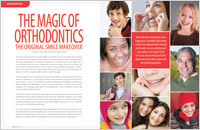 For many teens, braces are a rite of passage: They're one more example of the changes adolescents go through at this time — along with growth in stature, edgier tastes in clothes and music, and an increasing degree of self-awareness. But is there any particular reason why orthodontic appliances and teenagers seem to go together? In a word: Yes.
For many teens, braces are a rite of passage: They're one more example of the changes adolescents go through at this time — along with growth in stature, edgier tastes in clothes and music, and an increasing degree of self-awareness. But is there any particular reason why orthodontic appliances and teenagers seem to go together? In a word: Yes.
There are several good reasons why adolescence is the optimal time for orthodontic treatment, though occasionally even earlier intervention is called for. One has to do with the development of the teeth: There's no set timetable for every kid, but generally by the age of 11-13 the deciduous (baby) teeth have all been lost, and the permanent ones have largely come in. This is the time when we can go to work correcting the problems that cause a bad bite (malocclusion), improper tooth spacing or poor alignment.
Orthodontic problems don't improve with age — they simply become harder to treat. It's easier to treat many orthodontic problems during adolescence because the body is still growing rapidly at this time. Whether standard braces are used, or appliances like palatal expanders, improved appearance and function can be created in a short period of time. In later years, when the bones of the face and jaw are fully developed, many conditions become more difficult (and costly) to treat.
There's even a social element to getting orthodontic treatment in adolescence. If you need braces, you're not alone! Chances are you'll see some of your classmates in the dental office, and you may even make new friends as you go through the process together. When it's done, you'll have a smile that you can really be proud of, and benefits that will last your whole life.
The Orthodontic Treatment Process
What can you expect when you have orthodontic treatment? It all depends on what kind of treatment you need. At your first appointment, pictures and radiographic (X-ray) images of your mouth are usually taken, along with impressions of your teeth, so that a model of your bite can be made. This information will be used to develop a treatment plan. It may involve regular braces, with or without elastics (rubber bands). A specialized appliance may also be recommended for a period of time. Here are some of the most commonly used orthodontic appliances:
 Metal Braces need no introduction. But you might be surprised to find they're smaller and lighter than ever. They may even offer some customized options, like colored elastic ties on the brackets.
Metal Braces need no introduction. But you might be surprised to find they're smaller and lighter than ever. They may even offer some customized options, like colored elastic ties on the brackets.
 Clear Braces feature brackets made of ceramic or composite materials which blend in with your teeth, making them harder to notice. They're suitable in many situations, but they cost a little more.
Clear Braces feature brackets made of ceramic or composite materials which blend in with your teeth, making them harder to notice. They're suitable in many situations, but they cost a little more.
 Clear Aligners for teens is a series of removable, clear plastic trays that gradually straighten teeth as they're worn (for 22 hours per day). Formerly recommended only for adult patients, they now come with special features — like compliance indicators to tell how often you've been wearing them — that make them appropriate for teens in some situations. The advantage: they're practically invisible!
Clear Aligners for teens is a series of removable, clear plastic trays that gradually straighten teeth as they're worn (for 22 hours per day). Formerly recommended only for adult patients, they now come with special features — like compliance indicators to tell how often you've been wearing them — that make them appropriate for teens in some situations. The advantage: they're practically invisible!
 Lingual Braces offer the most unnoticeable form of orthodontic treatment because they are attached to the back (tongue side) of the teeth, where they cannot be seen at all.
Lingual Braces offer the most unnoticeable form of orthodontic treatment because they are attached to the back (tongue side) of the teeth, where they cannot be seen at all.
Other orthodontic appliances may be recommended in some cases, where major tooth or jaw movement is needed. They can range from small devices that fit inside the mouth to external headgear. But don't worry: You'll get used to them, and they're temporary — but they provide a long-term benefit in a short time.
How Long Will I Wear Them?
There's no one answer that fits everyone: It all depends on what has to be done in your individual situation. Generally, however, the active stage of orthodontic treatment lasts 6-30 months. Afterwards, you will wear a retainer for another period of months. When your orthodontic treatment is complete, a new smile will be yours for a lifetime.
Related Articles

The Magic of Orthodontics Proper alignment of the teeth is basic to “Smile Design.” Their position dictates how they work together and affects the way you look and smile. Only orthodontic treatment can move teeth into the right position. Simply put, when things look right, they probably are right. Learn the basics of smile analysis and design and whether the magic of orthodontics will work for you... Read Article

Moving Teeth with Orthodontics Moving teeth orthodontically is a fascinating process by which the bone that surrounds and supports teeth is gently forced to remodel itself. Orthodontics moves teeth with a careful manipulation of force that guide the teeth into a new, improved position and better equilibrium. Light, constant forces applied to the teeth allow them to move in a predictable manner and direction... Read Article

Clear Aligners for Teenagers Teens who regard traditional braces as restrictive, confining, and obstructive to their lifestyles now have another choice for orthodontic treatment: clear aligners. This advanced dental technology, originally geared toward adults, has recently evolved to treat a greater variety of bite problems in younger people. These improved orthodontic appliances can help teens function normally during a difficult phase of life... Read Article
